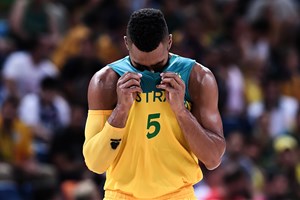
FIBA Secretary General Baumann calls for global support of wheelchair basketball
CHARLOTTE (Steve Goldberg's Wheel World) - Across the world, from me at least, something significant happened last week. While the full measure of its impact and importance may not be fully judged for some time, a seed planted long ago just received a fertile boost.
FIBA held its first-ever Mid-Term Congress on May 4-5 in Hong Kong, bringing together delegates from 146 national federations. It was a very specific audience and one that the International Wheelchair Basketball Federation (IWBF) truly needs to engage with to help maximize the wheelchair game, and the opportunities it offers, to the overall franchise of basketball.
That effort received a big assist from FIBA Secretary General Patrick Baumann when he gave wheelchair basketball a resounding endorsement.
"The International Wheelchair Basketball Federation," said Baumann, "is an organization that is autonomous (and) separate but (one) that we have been supporting for many years and who has recently decided to relocate its core activities and headquarters in Basketball House in Switzerland so our relationship with them is getting closer and closer."
Identifying the IWBF as a key stakeholder of FIBA alongside organizations including the International Olympic Committee and the NBA, Baumann upped the ante for a governing body that was formalized as the first truly sport-specific independent Paralympic governing body in 1993.
He then asked his audience to do the same.
"In some countries, you may have the opportunity, a chance, or a challenge, it depends, of working with the wheelchair basketball community. In some countries, they are separate. In some countries, you govern them. In others, there are a mixture of relationships."
"What I can say is that it is also our role to help and take care of them."
Before anyone mistakes his sentiment as patronizing to the wheelchair game, I will say that the FIBA boss was referencing the organizational aspects of wheelchair basketball, not the participants, and that's an area in desperate need of assistance in too many nations.
Members of the IWBF Executive Council on their visit to FIBA Basketball House in April.
He told the assembly that it was not so much a legal obligation, "but if there is a way to help; if there is a way to bring that sport inside and embrace it even more, please do so and help them.”
His words remind me of a similar statement made by Douglas Ivester, the former Coca Cola chief when they became the first worldwide sponsor of the 1996 Atlanta Paralympic Games. He said, "We're not sponsoring the Paralympic Games just because it's the right thing to do; we're sponsoring the Paralympics because it's good business."
Wheelchair basketball has a home at Basketball House.
The IWBF and its member national governing bodies will be the first to tell you that they, like any Olympic/Paralympic sport, appreciate all the help they can get.
IWBF Deputy Secretary General, Norbert Kucera, was in Hong Kong for the congress on behalf of IWBF and expressed the collective gratitude for Baumann's words. " The IWBF has been working hard to develop a closer relationship with FIBA and be a part of the basketball family. We are not only immensely proud this was recognized at the FIBA Mid-Term Congress but also very appreciative that FIBA have given the opportunity to engage with them on a world stage."
We hope this is just the beginning of a burgeoning partnership that can help and drive wheelchair basketball not only at an international level but also at national level. Norbert Kucera
Perhaps the best example of vertical integration at the national level is Basketball Australia where the Rollers (men's senior wheelchair team) and the Gliders (women's senior wheelchair team) share effort and glory with the standing Boomers (men) and Opals (women) national teams. The Aussies do love their nicknames, don't they.
The national wheelchair teams are fully integrated into the operations and focus of Basketball Australia.
The National Wheelchair Basketball Association (NWBA) certainly would like to have better relations with USA Basketball and that's at the top of the priority list for the leadership there.
In Great Britain, it's the standing game that could use assistance from British Wheelchair Basketball, which has been far more successful on the international stage and has recently grown its women's game to contender status.
Baumann said, "With the extraordinary changes in governance made in 2014, FIBA is progressing very fast. We find ourselves in an environment where it's a case of 'change or be changed' and we definitely want to be in control of our own destiny."
That's something the IWBF and its membership want as well.
But first you get by with a little help from your friends.
Steve Goldberg
FIBA
FIBA's columnists write on a wide range of topics relating to basketball that are of interest to them. The opinions they express are their own and in no way reflect those of FIBA.
FIBA takes no responsibility and gives no guarantees, warranties or representations, implied or otherwise, for the content or accuracy of the content and opinion expressed in the above article.
To help make this column as inclusive as possible, please send any national or international event information, story suggestions, or comments to wheelworldmail@gmail.com.

















